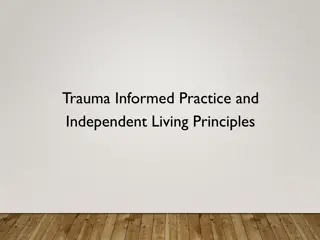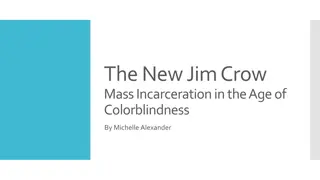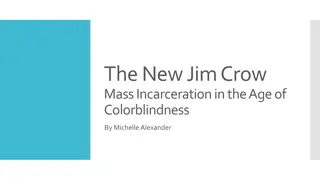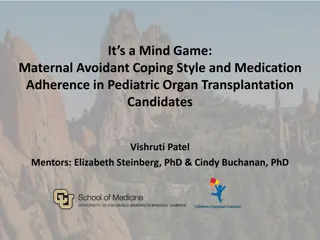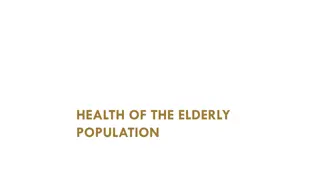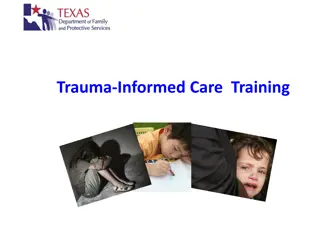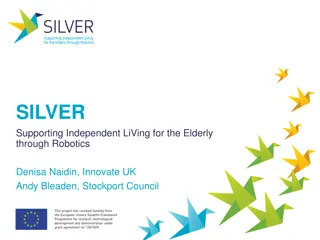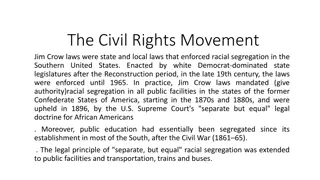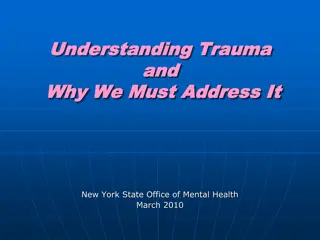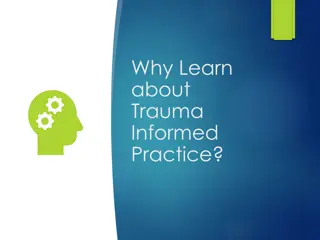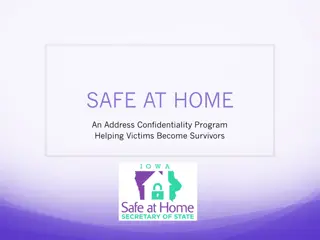Intergenerational Trauma: Coping Strategies of Elderly African American Survivors of Jim Crow
Exploring coping strategies passed down by survivors of Jim Crow to the next generation, this qualitative research project conducted interviews with nearly 100 elderly African American survivors. Key findings reveal the long-term psychological impact of racially traumatic events and diverse coping mechanisms adopted by individuals, including feelings of rage, shame, and anger, as well as responses such as obedience, resistance, denial, and collective forgetting.
Download Presentation

Please find below an Image/Link to download the presentation.
The content on the website is provided AS IS for your information and personal use only. It may not be sold, licensed, or shared on other websites without obtaining consent from the author. Download presentation by click this link. If you encounter any issues during the download, it is possible that the publisher has removed the file from their server.
E N D
Presentation Transcript
Michael M. Davis Lecture Series University of Chicago Intergenerational Trauma Clinicians Trained to Diagnose and Treat Elderly African American Survivors of Jim Crow Suffering with Symptoms of Segregation Stress Syndrome Dr. Ruth Thompson-Miller University of Dayton Department of Sociology
Jim Crow Segregation (1896-1960 s)
Research Question To explore what, if any, coping strategies survivors of Jim Crow passed on to the next generation
Methodology Qualitative Research Project: Interviews Newspaper Databases (ProQuest Historical Black Newspapers) Recruitment: African American social clubs Churches Events in the community
Participants Interviewed nearly 100 elderly African American survivors doctors, lawyers, teachers, domestic workers diverse SES. In the Southeast: 52 respondents (37 women and 15 men). 65% were over 70 years of age, with the rest between 52 and 69. In the Southwest: 40 respondents (25 women and 15 men). 75 % were over 70 years of age, with the rest between 58 and 69.
Interview Setting Interview Setting Typically, I interviewed elderly African Americans in their homes or in a location where they felt most comfortable and safe. Interviews The interviews consisted of a series of several open- ended questions. The interviews usually lasted about an hour or more.
Key Findings in Narratives Racially Traumatic Events Rape (attempted rape) Lynchings (loss of life) Loss of Land African Americans are dealing with the long term psychological consequences of those traumatic experiences segregation stress syndrome Witnessing Experiencing Hearing
Reactions to Traumatic Event African Americans had diverse strategies to cope and deal with the event. They exhibited feelings of: Rage Shame Anger Some coped with: Obedience Resistance Denial of Event Collective Forgetting
Segregation Stress Syndrome In PTSD literature; war, disaster, rape, and other terrorisms are strong predictors. Segregation stress syndrome; created by similar events, unable to protect themselves or family members in dangerous situations. A key aspect of segregation stress syndrome is the underlying fear that you or your family could be killed or harmed without warning or reason. The symptoms varied based on the severity of the experience of the traumatic event, time of earliest exposure, the length and frequency of exposure, and the severity of witnessing a racial traumatic event.
Segregation Stress Syndrome Survivors Exhibited: Fear, mistrust, and avoidance of those that inflicted the racial violence. Avoidance of settings that trigger painful memories stores, water fountains, and buses Hyper-vigilance Are you sure noone will know that it is me? Framed negatively by society as black paranoia Memories triggered by symbols of Jim Crow- police brutality, voting restrictions, and lack of educational opportunities. Physical Symptoms: Sweating, crying, trembling, emotionally upset when recalling the traumatic racialized events of the past. Emotional numbness
My First Experience: I Was So Scared for My Mama My mother would wash clothes for Mr. Smith, back when I was 16. I would help my mother by using an iron to press the clothes. He always wanted his shirts cleaned and pressed. Back then you didn t have bleach. You had to use lye. We used a washing board to scrub the clothes. . . .I remember one day I don t know what happened, but there was one spot on the corner of his collar and he started cussing. . . . He just kept cussing and yelling at my mama. I was so scared for my mama. . . She just kept saying, I m sorry sir, I m sorry sir, it won t happen again. . .Yes sir, yes sir, sir I m sorry. It won t happen again. She was begging and pleading with him. I remember that being my first memory. (Childcare worker over 70)
The Threat Of Rape: I Didn t Want It to Happen To Me I remember one Sunday afternoon. . .a white man came to our house. I must have been about 15 . . . .This man knocked on the door. My mom was sleeping. . . .My brother was in the next room sleeping. I answered the door. The man looked like he was spellbound. It frightened me, so I started backing up, and he started following me. He went straight through my mom s bedroom and my brother s bedroom. I ran . . . he was following me. My brother sat up in the bed, to see what was happening . . . he came behind him. I can remember . . . my sister saying, Oh, no, no, Richard. No, no, no. He was going to hurt him. . . I ran up under the house and hid. He walked in the yard looking for me and eventually he went on and got in the car. My dad wanted to know who he was. . . I was never able to tell him who he was. I couldn t remember telling him what he looked like. It frightened me. I was young and it frightened me. I knew that these things happened and I didn t want that to happen to me. . . .It was terrible. . .it was very frightening. My brother wouldn t have been able to do anything about it. (African American Woman over 70)
The Trauma of Rape: He Raped My Aunt Kitchen Babies In later years, my mother and her sisters would never tell us anything but I have. . . .a cousin. But I called her Aunt Bell. She told me, that this white prostitute across the street, Ms. Ann, my Auntie Celeste worked for her and she was over there working one day and this [white] man, that owned a store a block up the street, came to see Ms. Ann. . . .He was married. Ms. Ann wasn t there, and he raped my Aunt [she pauses] and my Aunt got pregnant and when she got pregnant she told them [her family] what happened, she told them that he had raped her that day and they went to talk to him, and you know what they did? They made her leave town. They said, You have to send her out of town. My Aunt said, That is what they did to Blacks. The white men would rape the Black girls, and if the Black girls got pregnant the families would have to send them out of town to have the babies. . . .That s what happened in that situation in the family. . . She would tell me other families [that] it happened to, in [names town]. . . . Our family wasn t one that told a lot of things. You see, they wanted to hide everything that s what they wanted to do. My mother or my aunt would never have told me about you know [about] her situation they would have gone to their grave with it.
Morality and Innocence: She Was Sanctified This lady s name was Elizabeth Smith and she was going to the sanctified church around the corner from Mt. Carmel Church. And she got kidnapped by a white guy, and he took her out in the woods and sodomized her and raped her. . . He never served a day in jail... She wasn t even married or anything at the time. (African American male 60 s)
Black Historical Newspapers [62 year old] White Man Charged with Rape of Eight- Year-Old - best citizens of the race Kansas (Chicago Defender 1915). White Male Abducted two Black Sisters, The 11-year- old is in sanitarium in serious condition due to the assault, and her 17-year-old sister is at home suffering from exposure and severe nervous shock (Chicago Defender 1926). Kentucky 16-Year-Old Raped (New Journal and Guide 1931). Police allowed man to leave town. An 11-Year- Old Child Raped Delivering Clothes Pennsylvania (New Journal and Guide 1932). A Black Girl Raped While Babysitting Mississippi (Chicago Defender 1955)
Greenwood in Tulsa, Oklahoma Loss of Land
The Great Migration??? In the book, Buried in the Bitter Waters, Elliott Jaspin states, There are many counties in the U.S. where racial cleansing occurred than previously known. History is what we choose to remember. . . .The racial cleansing that struck Forsyth County, Georgia in 1912, for example engulfed at least a half dozen surrounding counties in northern Georgia before it burned itself out in 1913.
Racial Expulsions Indiana: Washington and Vermillion Counties Texas: Comanche County Tennessee: Polk and Unicoi Counties Arkansas: Sharp and Boone Counties Kentucky: Marshall, Whitley, and Laurel Counties North Carolina: Mitchell County Georgia: Forsyth and Dawson Counties
Ku Klux Klan Lynch Hammock
The Trauma of Lynchings: We Had to Try and Protect Our Children! They did use to hang people. . . .The last two, I know was [names two young men]. . .caught them with a white girl. I think they were fooling around with the girl all the time, and she got caught. They hung them. . .didn t put it in paper. [Whites] just went, broke into the house, and just grabbed them while they were sleeping. They say that, the girl say that they raped her. [Was there a trial?] No. Those boys were teenagers, they might have been About nineteen, twenty. . . . They were young! [African American Women over 70]
Resistance: We Had to Resist!
Intergenerational Transmission Trauma transmission: socialization process Watching family members interactions Listening to conversations Warnings of caution Mount Sinai Research Team (Holocaust Survivors) led by Rachel Yehuda. Genetic evidence of transmission of stress-related gene.
What Can We Do? Protect Rape Survivors: Remove names of children raped from newspapers in databases Time Limitation Laws on Filing Rape Charges Segregation Stress Syndrome Triggers: Violence Against Young Black Bodies (Police Brutality) Mass Incarceration Provide Training for Mental Health Clinicians Cultural Competence (Listen to Survivors) Research on Jim Crow Survivors We need more research and acknowledgment
Thank You Questions Feedback




